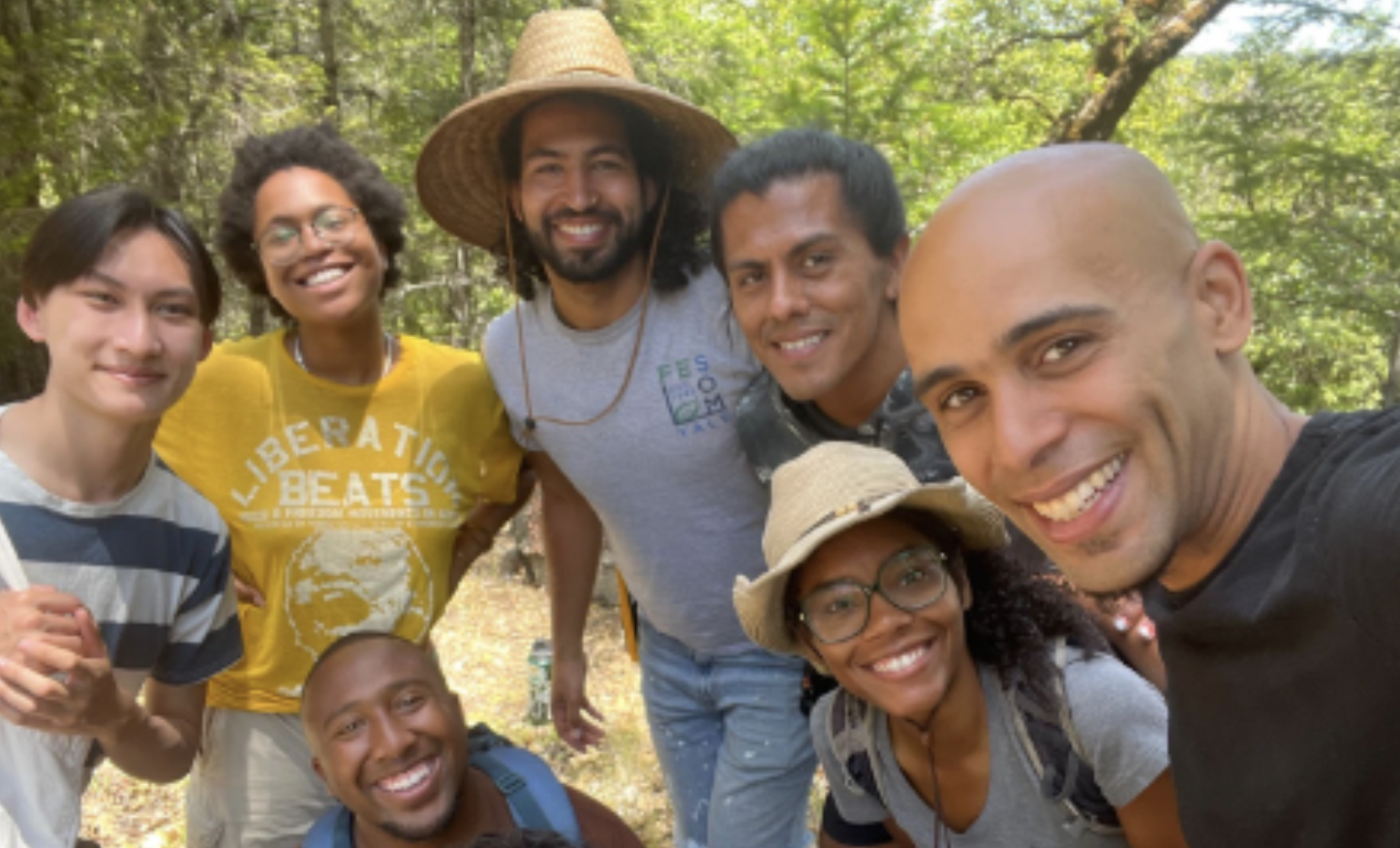
As told by Professor Myles Lennon:
"For the past eight months, I have been conducting fieldwork at Shelterwood, a queer, Black and Indigenous land stewardship collective and nascent retreat center in a redwood forest on unceded Kashaya and Southern Pomo land in northern California. This in-depth ethnographic project is the centerpiece of my broader research on how young Black land stewards in the United States negotiate the ethical and political tensions of doing antiracist, decolonial work in outdoor spaces through property ownership in a settler colony built on racial capitalism. How do you own land when you don’t believe in land ownership? How do you liberate your livelihood from a system of labor you know you can’t ever escape? I consider these questions by exploring the corporeal, institutional, and community-building practices through which young Black land stewards “return,” in their words, to land they never knew before.
At Shelterwood, this work has primarily entailed the documentation of the collective’s “year of rooting”—i.e. their inaugural year—at a 900-acre forest in Cazadero, California that they purchased from a church for $4 million in July 2021 with significant philanthropic support. The collective presently consists of four full-time members who live and work on the land and a much broader community of land stewards, aspiring farmers, artists, and activists who primarily live in the San Francisco Bay Area. As a member of Shelterwood’s board, I have been granted close ethnographic access to the members of the collective, who have allowed me to live in a cabin in the forest for the year with the charge of identifying best practices and lessons learned to share with other queer, Black and Indigenous land stewards throughout the US. As a full-time resident of Shelterwood, I am also responsible for: supporting their hands-on forest restoration work, largely through the removal of non-native tree and plant species and controlled burns; helping to manage their dilapidated physical infrastructure; lending a hand with on-site construction projects; giving tours of the forest to visitors; and closely supporting fundraising and organizational development initiatives.
My ethnographic focus and Shelterwood’s organizational priorities have largely centered on bringing regenerative fire back to northern California. Through controlled burns based on the knowledge of the Kashaya and Southern Pomo people, Shelterwood aims to redress the risk of wildfire and demonstrate how Black and Indigenous land stewardship practices are essential to climate resiliency. Specifically, Shelterwood was founded on the principle that the climate crisis emerged from the separation of human culture from the non-human world through Indigenous genocide and the trans-Atlantic slave trade. They recognize that the Euro-American ideal of “pure” nature without the “disturbance” of human beings is rooted in the forceful removal of human communities from forested land in service of an extractive paradigm of production pioneered through anti-Black slavery. This, in turn, criminalized the fire-based stewardship that had kept forest ecosystems thriving and healthy for 10,000 years prior to colonization, paving the way for tremendously overgrown forests that are dangerously susceptible to wildfire. To address this, Shelterwood is launching an ambitious Black and Indigenous forest restoration plan that is returning fire to the land at an unprecedented scale with the support of a multi-million-dollar grant from the State of California. This plan entails not only care for non-human species but also the intentional integration of human communities into the forest, embracing a queer ethic of “chosen family”—the LGBTQ practice of making your own kin, separate from your blood lines—to demonstrate how humans can choose to live “in right relationship” with the non-human world.
As part of my research with Shelterwood, I created a paid summer fellowship program for five Brown undergraduate students. After a rigorous selection process with 26 applicants, we officially launched the program on June 1, when the five selected students moved to Shelterwood for the summer. The program offered these students the opportunity to fuse Black/Indigenous land stewardship/forestry, land-based community-building, and ethnographic research, primarily through 9.5 weeks of immersive, applied learning. The Fellowship program has three overarching objectives: (1) prepare the next generation of BIPOC stewards to cultivate land-based, climate justice practice and theory; (2) generate qualitative knowledge to support decolonial BIPOC stewardship as part of my overarching research project; and (3) support the organizational development of Shelterwood.
Throughout the program, we facilitated a botany training, a chainsaw training, and a workshop on autoethnography and environmental anthropology, and immersed the students in Shelterwood’s work and long-term projects, including climate-resilient land stewardship, land-based coalition building among queer/BIPOC communities, Indigenous land-based living practices, and organizational communication and strategy. Students were paid a generous living stipend and the program covered their room and board, allowing them to focus their time and energy on fostering a living community in the forest. They also ethnographically documented their experiences on the land, and I am working closely with each of them to draw from their insights and data as part of my broader research project. Finally, the fellowship program is helping Shelterwood develop an applied approach to intergenerational land stewardship training."